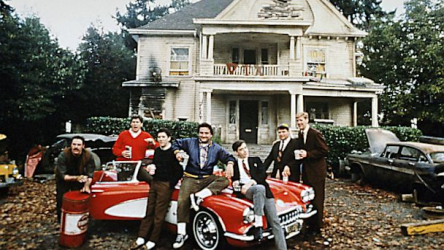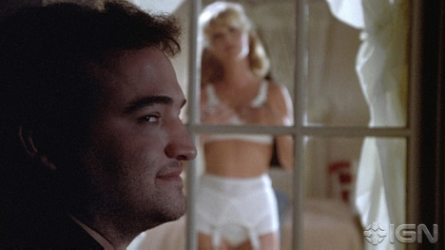Among the words one doesn’t expect to hear in a review about a movie called Animal House is “quaint”. And yet, nearly 40 years later, I will say that this film—the gross out, vulgar, raunchy comedy of its day—”quaint” is how I’d describe it. I recall Charles Champlain’s review of it (read years later when pulling old newspaper out of a shelf lined years earlier) where he gave it a large number of stars, like four out of five, but added “I wanted to like it more than I did.” That was how I felt about it when I saw it, after hearing rave (and often leering) reviews of the first, best and possibly only truly good film to come out under the National Lampoon banner. (John Hughes notwithstanding, Vacation is not really a good film.)

It’s funny ’cause college kids don’t act like children, see?
It is a good film but the comedy actually doesn’t hold up very well. That’s not a contradiction, really: The thing that made this movie a smash hit, I would venture to say, was the titillation and shock humor and shock humor (even more than titillation), like shock horror, loses its potency rapidly. So we didn’t laugh all that much, really. Another aspect which doesn’t hold up at all was that sense of rebellion: 1960 students bucking the system for no real end other than dissolution. That still, somehow, had some bite in 1978, I guess, especially for those who had some inkling of it growing up. Now it’s like trying to relate to Mildred Pierce. In our brave new world, everyone is Bluto, though certainly most lack his insouciance.
John Belushi’s bits hold up very well, having in them certain elements like a debauched Chaplin or Keaton. This talented fellow shot the film 4-5 days a week and ran off to shoot “Saturday Night” the other 2-3 days. It’s perhaps less astonishing that he died from speedballs than that it took him four years beyond this point to do so.

Seen here enjoying some folk music.
The movie itself is remarkably solid however, as a narrative, as a character study, and even as a study in camaraderie. It hangs together well: It’s not just a series of gags (though there are plenty of those); we do learn aspects of the characters’ natures. And it works because the apathetic creed that underlies it is never dressed up. Friendship with your fellow Delts is a dubious thing. They might be there for you, but they aren’t going to share your priorities. Put it this way: If we don’t laugh at a modern shock comedy (or even plenty of comedies back in the ’70s and ’80s), we’re bored because there’s literally nothing or no one less to care about: The characters are simply elements of a prop comedy gone staler than Gallagher smashing a watermelon in 1981.
Here, though, we sort of care about these guys. The world is stacked against them unfairly (if not entirely so) and they’re not really harming anyone, except the moral structure of the community which (as is always the case in these sort of counter-culture type things) is none too solid to begin with. (It never occurs to the hypocrisy crowd that a fragile moral structure might be a good reason to avoid messing with it, but that’s not really on point.) Too, their opponents are made as soulless as possible. It’s a comedy; we have to be free to enjoy the suffering of the unjust as much as we do in a revenge picture.

“You trusted us.”
Another thing that holds up really well? The naked girls. There’s this short window from the late ’60s to the early ’80s where women could be naked in a mainstream film, but before the ultra-lean-with-implant aesthetics took over. The Flower, who adores (as an artist) the pin-up, like the images on the sides of planes and the work of Gil Elvgren much favors the soft, feminine curves seen here versus the hard, muscular lines which have held sway for the past 30 years. The contrast is actually rather stark. And it probably makes them look younger, too. Mary Louise Weller, who has the most famous, 4th-wall-breaking nude scene (where John Belushi leers at the camera in-between ogling her) was in her early ’30s at the time. Movies from the ’80s, in stark contrast, tend to shove their silicone and sweat in your face.
So, yeah, as a quaint little movie with some laughs and quotable lines, it holds up okay. The Flower and The Boy both liked it, though it was no Dr. Strangelove or Planet of the Apes (1968), both of which seemed to transcend the limitations of their era much better.

Naughty!
